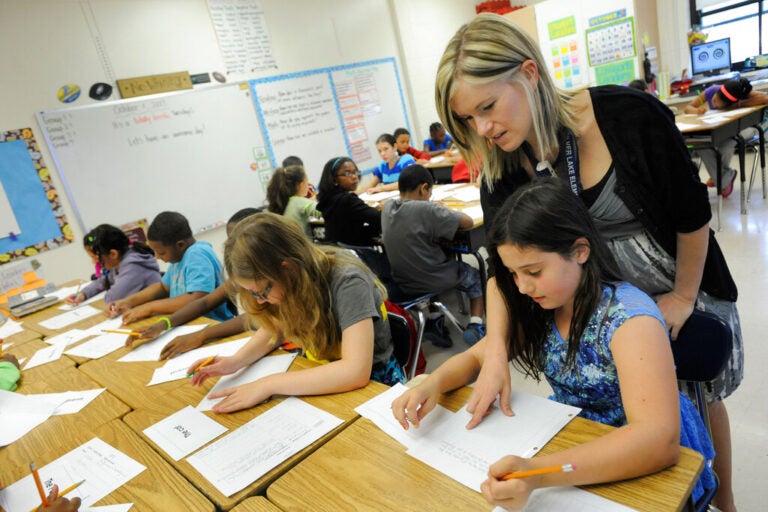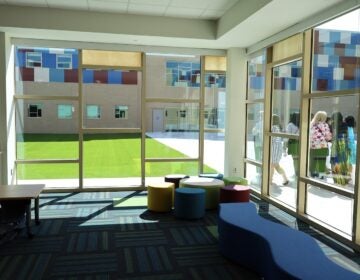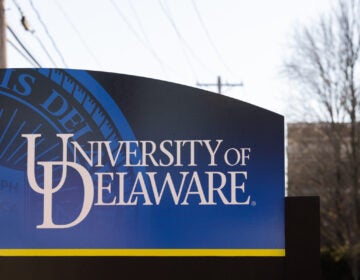Better pay, cultural competency part of 10-year plan to improve Delaware schools
A recent survey underscores the need for better teacher compensation, professional development in cultural competency and universal early childhood care in Delaware.
Listen 1:26
File photo: Amy Lawson, a fifth-grade teacher at Silver Lake Elementary School in Middletown, Del., helps student Melody Fritz with an English language arts lesson Oct. 1, 2013. (AP Photo/Steve Ruark)
From Philly and the Pa. suburbs to South Jersey and Delaware, what would you like WHYY News to cover? Let us know!
A Delaware group hoping to set the agenda for the next 10 years of improving the state’s schools is out with its latest proposal.
Since 2005, the Vision Coalition of Delaware has focused on shaping education through 10-year plans, starting with Vision 2015 and followed by Student Success 2025. Now in its third phase, the group aims to improve funding equity among districts, better support teachers and improve student outcomes both after high school and in early childhood classes.
Organized by the Rodel Foundation, the coalition consists of leaders across various industries, working to shape the future of Delaware’s education system.
“The Vision Coalition, from the time it began … has been focused on working alongside our education systems in Delaware to support work in the necessary areas,” said Shelley Rouser, department chair for the education department at Delaware State University.
“So while the vision to support school systems and making sure that practices and policies are an alignment with school needs, that’s been a constant focus for the Vision Coalition. What’s changed over time are … you know what those needs are. So while that has evolved, the mission has remained constant.”
With over 30 years in education — from classroom teaching to district leadership and now a university role — Rouser gained first-hand insight into the field’s evolution. As part of the leadership team, she’s seen how the changing educational landscape affects students, educators and policies, identifying unique needs and challenges at every level.
In 2023, the coalition surveyed educators, parents and the public to assess the current state of education. The findings highlighted notable improvements statewide in educational technology, mental health support and early childhood education, reflecting positive changes across diverse perspectives.
Despite those advancements, Rouser said that after hearing ideas and concerns from the public at various forums, there’s still areas in need of improvement.
“The focus around being career ready and life ready has introduced some new themes to us … and paying more attention to cultural awareness is certainly something that we’re hearing more of this time around than we heard the last time,” Rouser explained. “Digital literacy is something that we’re hearing more of now than we heard the last time around. Even technology that has elevated.”
”For example, even the introduction of [artificial intelligence] is something that we’re all figuring out and we have to figure it out quickly. So things like that, I think present challenges to teachers,” she said.
As the coalition convenes, they recognize that their long-term goal for 2035 includes enhancing educator support through professional development with a focus on bridging cultural competency gaps, improving teacher compensation overall and strengthening early childhood care.
“We know of the early childhood workforces struggle points, compensation and advocating for more fair compensation,” she said. “Advocating for children to have access to high quality early childhood systems.”
Another team leader, Jon Cooper, the health and wellness director for Colonial School District, echoed Rouser’s call for broader access to childcare, noting that in Delaware, public preschool is currently only free for children with disabilities.
“We don’t have what’s considered universal preschool. The Vision Coalition is advocating for universal preschool, meaning that it wouldn’t be compulsory. So compulsory attendance doesn’t start [until] kindergarten, but the idea would be that students who are three or four years old would have a free public school opportunity,” Cooper said.
Cooper co-chairs the student support committee and said the feedback they’ve received highlights the need to meet students’ varied needs, from college readiness to critical mental health services, supporting a well-rounded approach to learning.
“We’re looking to strengthen the ability for our school systems to support students over and above just the academic instruction. Included in that is the increase of mental health supports for students,” he said. “And increasingly developing partnerships with private providers and health care systems to be able to address students’ mental health needs.”
The Vision Coalition of Delaware’s plan for 2035 is set to be released in March 2025. The group hopes it will inspire community engagement and legislative support.

Get daily updates from WHYY News!
WHYY is your source for fact-based, in-depth journalism and information. As a nonprofit organization, we rely on financial support from readers like you. Please give today.








